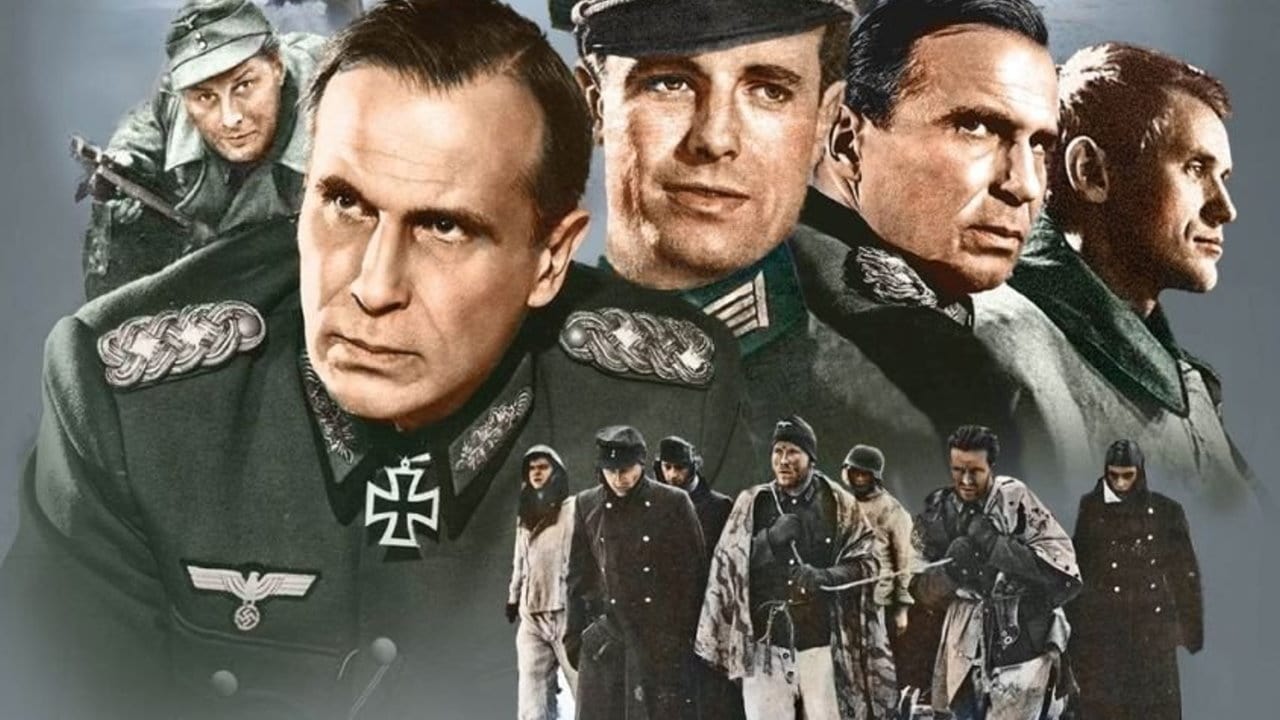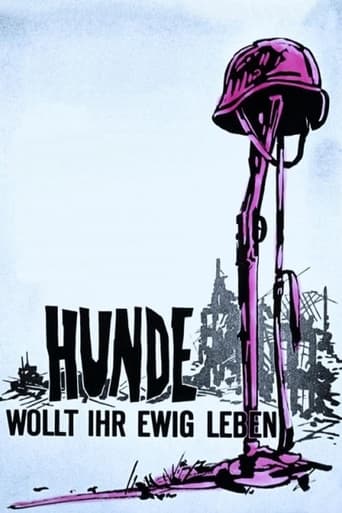Brightlyme
i know i wasted 90 mins of my life.
Fairaher
The film makes a home in your brain and the only cure is to see it again.
Quiet Muffin
This movie tries so hard to be funny, yet it falls flat every time. Just another example of recycled ideas repackaged with women in an attempt to appeal to a certain audience.
Freeman
This film is so real. It treats its characters with so much care and sensitivity.
Horst in Translation (filmreviews@web.de)
"Hunde, wollt ihr ewig leben" or "Dogs, Do You Want to Live Forever?" or just "Stalingrad" is a West German black-and-white novel-based film from 1959 written and directed by Frank Wisbar (with some more writers). And just like so so many other German films from that era, it is an attempt at coming to terms with what happened in the country during the years of World War II. I personally must say, when it comes to this genre, I rather watch these films that elaborate on the motivations and the political context instead of going deep into the subject of military units and endeavors. But this is what this black-and-white film here does. You must have a really deep interest in old German film, in order to recognize some of the cast members here, even if they have (had) prolific careers and even appeared in a couple pretty successful Hollywood films. But back to this on here: my dislike of it in terms of contents is purely subjective as I already described. But I also have to criticize that I found none of the main characters really interesting or relatable and that's why I did not really feel for or care about them. Consequently, my overall verdict is thumbs-down. This film offers nothing that most of the other German war-themed films from the 1950s and 1960s don't.
brianshoebridge1
Made soon after the few survivors of Stalingrad returned home, wounds were still fresh & deep when this film was released just 14 years after the unconditional surrender. This film is important because was one of the first German post-war films to critically examine some very difficult & painful areas for the Germans. Interestingly we never see Hitler's face - I'm sure there are a few reasons for that. The film addresses the lie that the Allies of Germany, Rumania (and Italy et al for that matter) were poor troops. They were good soldiers but were indeed poorly equipped & supported.There have been criticisms for mis-matching of stock footage, incorrect tanks (T-34/86 instead of T-34/76) & subtitling. Most of this is minor, for example mistaking "Oberst-Leutenant" (Lt-Col) for "Oberleutenant" (Snr Lt) and mis-spelling General Hoth's name (as "Hooth"). The translating of "break-out" as "break ranks" is trivial. The actual footage spliced in may be of different battles but given the time & place this was made it seems a reasonable thing to do. In the end, getting squashed by a Russian tank or disintegrated by high explosive shells is much the same experience wherever you do it.No, 14 years was not long enough for a deep introspection but this film made a solid start down that path. Well worth seeing. Look out for the exceedingly & implausibly beautiful Sonja Ziemann.
wuf0170
This refers to the English subtitled release of this film.This film deals with a tragic defeat and the destruction of the 6th Army at Stalingrad. It was produced shortly after the German POWs taken at Stalingrad had returned home, so had to deal with a critical and knowledgeable audience. It also walked a tightrope, delivering an anti-war message and condemning German leadership in a country which was sick unto death of finger pointing and criticism.The events in the film take place over more than four months. In order to tell the story coherently, the film shifts focus from narrative to vignette. As the story nears its end, the focus narrows and remains with the troops trapped in Stalingrad, starving and written off by Hitler. All in all, it is well told and the acting is quite good.On the downside, whoever did the subtitles could have done a better job. I speak German and seeing the subtitles while hearing the dialog and knowing a bit of the history created a bit of a dissonance. General Hoth's name is repeatedly written "Hooth", breakout (as in a breakout from the encirclement) is translated as "Breaking ranks," OberLeutnant (1st Lieutenant) is written as "Lieut. Col.", and when von Paulus uses the word Meuterie (Mutiny), it is translated as disobedience. I suspect that those who are familiar with the history of the battle for Stalingrad and military ranks, but who don't speak German, may have a bit of a problem. these problems with the subtitles led me to give this movie 4 instead of 5 stars.Still, the story is well told and survives the translator's bludgeon. I was left wanting a bit more. Few films these days manage that.
Ucurian
A lot of times I read here by IMBD, that there are only three war-films on the eastern front (Cross of Iron, Stalingrad and Enemy at gates). There are a lot of other european films with this topic and for me this one is the best of all. There are war films better than this, but no one at the eastern front.

